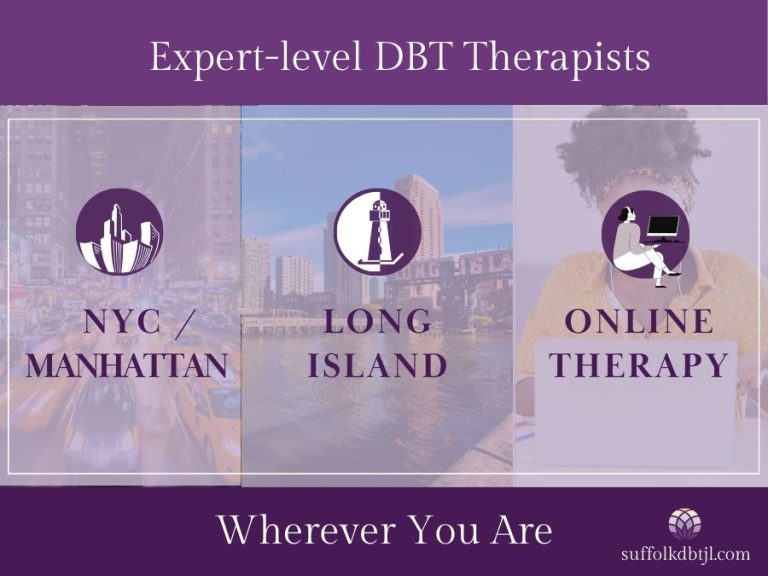
Society often views adoption as a beautiful, selfless act of compassion and love that can enhance the lives of adoptees and the forever families that adopt them. While there are many positive aspects of adoption, there can be some negative ones, too, such as adoption trauma.
Being adopted is a life-changing experience that impacts adoptees and their families in a variety of unique ways, as no two adoption journeys are the same. The impact on emotional, mental, and behavioral health can occur at any life stage, with adoption trauma in adults being a possibility in the aftermath of adoption. With this in mind, it can benefit adoptees and adoptive families to see an adoption-competent therapist, such as Suffolk DBT’s very own Ann Marie Pagano, LMSW.
Our adoption-competent therapist specializes in helping adoptees unpack their adoption experience and manage and cope with the often complex emotions, thoughts, and behaviors stemming from it. Whether adoptees are interested in finding biological parents or overcoming specific adoption trauma like transracial adoption trauma, adoption-competent dialectical behavioral therapy (DBT) is available to help them explore their experiences in meaningful ways that encourage emotional regulation, healing, and acceptance.

Adoption can affect mental and emotional health in many ways
Adoption trauma refers to harmful and emotionally distressing effects that can occur in and after the adoption process.
Individuals who experience maltreatment and traumatic circumstances in infancy, childhood, adolescence, and teenhood that lead to removal from threatening, chaotic backgrounds are at risk for brain structure and chemistry changes. They may still exhibit the effects of trauma into adulthood, making it difficult for them to adjust to new, safe environments. Some adoptees experience adoption trauma that looks and feels like
- Having difficulties trusting others or bonding and forming attachments with them
- An inability to cope with life transitions such as goodbyes, departures, and modifications to daily routines
- Lack of stability because of placements in multiple foster and adoptive homes
- Feeling misunderstood or incomplete if they don’t know where they come from
- Feeling guilty and anxious about having a curiosity or interest in finding biological parents
Adoption trauma in adults can manifest as a continued struggle with loneliness and a fear of being abandoned that keeps adoptees from establishing and maintaining meaningful connections with their families, friends, and peers.
Adoption can affect adoptees’ sense of self, identity, and belonging, too
It’s common for some adoptees to struggle with their identity and place in society, especially if they experience a specific kind of adoption trauma: transracial adoption trauma.
Transracial adoption trauma can occur when transracial and transcultural adoptions leave adoptees feeling a disconnect from cultures with which they have visible ties but don’t grow up exploring and embracing. Likewise, when adoptees are visibly dissimilar from their adoptive families, they may feel as if they don’t belong or have a culture or identity of their own they can comfortably exist in and claim.
Societal messaging can create crises for adoptees that are emotionally taxing and traumatic
Consider people of color adopted by white parents, guardians, and families. Their families may love and accept them and say color or genes “don’t matter,” but if racial differences aren’t acknowledged, discussed, and embraced in the household, adoptees may encounter traumatic identity crises upon learning they aren’t white like their family or having experiences with racism, discrimination, and prejudice to which their families can’t relate.
Adoptees may face situations and comments that cause, contribute to, and compound transracial adoption trauma, such as:
- “Be grateful you’re adopted.” This platitude is harmful in general because it can make adoptees feel unnecessarily indebted to their adoptive parents, but in the context of transracial adoptions of non-white children by white parents, it can project the image of the parent as a white savior.
- “You’re lucky” or “Adoption gives you a better life.” These comments also evoke the savior complex because while adoptions can provide happiness, love, necessities, and bright futures for adoptees in general, not all adoptions have positive outcomes. Furthermore, in the context of transracial adoptions, such statements assume that a life with white adoptive parents is automatically better than a life with biological parents of color would’ve been.
- “You’re not really____” or “You’re not____enough.” Adoptees of color with white parents or parents of different races and ethnicities may face judgmental statements that they’re not really Asian or not Black enough because they’ve been ‘whitewashed’ growing up without any ties and access to their roots. Comments like these and a perceived lack of racial mirroring with other people they observe and encounter of their same race can leave them with the awkwardness and pain of feeling like an impostor.
 Deciding to dive into your biological background
Deciding to dive into your biological background
A person who’s adopted may feel content, fulfilled, and loved within their adoptive families and yet still be curious about their history. They may long to connect with their biological roots, hoping that what they discover in their background can help them reconcile feelings of being incomplete or an impostor.
Adoptees may find it challenging to explain this to their families, though, for fear that their loved ones may not support the idea of them exploring their biological roots or may be insulted by it and take it as a rejection. Still, the decision to embark on this journey should be entirely the adoptee’s, free from external pressure or expectation. The decision is valid and deserving of respect and understanding.
Preparing to pursue parts of yourself unknown to you
Whether the choice to search for your biological roots is a quest for identity formation and a sense of completeness, closure, reconciliation, or uncovering potential health risks and genetic predispositions to conditions, it requires self-compassion and regulation.
Finding biological parents and exploring your roots can yield unexpected or unwelcome results and unearth painful memories and emotions. This journey may require you to confront unresolved feelings and even possibly face rejection from your biological family, potentially exacerbating adoption trauma in adults.
Become emotionally equipped to embark on your self-discovery journey in adoption-competent therapy at Suffolk DBT
An adoption-competent therapist is more aware of adoption’s effects compared to other therapists. They have professional experience with caring for people who’ve endured transracial adoption trauma and other forms of adoption trauma, continue to live with the impact of adoption trauma in adulthood, and have faced the emotions involved in the complex decision of finding their biological parents.
 In therapy sessions with an adoption-competent therapist at Suffolk DBT, clients learn how to manage their emotions and cope with adoption trauma and life’s challenges through DBT skills like:
In therapy sessions with an adoption-competent therapist at Suffolk DBT, clients learn how to manage their emotions and cope with adoption trauma and life’s challenges through DBT skills like:
- Emotional Regulation. DBT equips adoptees with strategies to manage intense emotions that may arise during the exploration process. Adoptees can navigate challenging emotions with greater resilience and self-compassion by cultivating emotional regulation skills, reducing the risk of becoming overwhelmed or emotionally dysregulated.
- Mindfulness. Mindfulness skills emphasize being in the present moment. Being mindful means observing, identifying, and labeling your thoughts and feelings without judgment. Finding your biological parents can raise a lot of what-ifs, complex emotions, thoughts, questions, and behaviors between you and the family who raised you. Together, you can learn to identify and accept your feelings, thoughts, and behaviors and change any negative ones when ready.
- Distress tolerance. Distress tolerance skills help you when you encounter situations that produce anxiety and other intense emotional states. Distraction, for example, is a distress tolerance skill that permits you to shift attention from what triggers anxiety or unpleasant feelings to something else, helping you cope. Likewise, instead of harmful behaviors like lashing out at others or turning to substances in attempts to numb extreme feelings that stem from things you can’t control, you can use self-soothing techniques that speak to your senses, like listening to your favorite music or applying soothing oils like lavender to your skin, to calm down and gain healthy control of the here and now.
- Interpersonal effectiveness. Adoption trauma can influence the way you bond and form relationships with others and how safe you feel in interactions. Interpersonal effectiveness skills promote effective conflict management and communication. These skills can empower you to assert yourself and your needs, feelings, thoughts, and opinions in healthy, respectful ways. Rely on these skills when you need to set personal boundaries regarding interactions and conversations you are or aren’t ready to have regarding your adoption, adoption trauma, or your experience finding your biological parents.
Reach out to us at Suffolk DBT when you’re ready. Our trained, licensed, compassionate therapists use their expertise to help you enhance your emotional regulation and respond more effectively to distress. In therapy sessions, you and your family will receive the support and guidance needed to communicate effectively and respect and honor everyone’s emotions and opinions in ways that promote acceptance and healing as you find your biological parents. Likewise, we’ll help you and your family facilitate meaningful, constructive conversations and interactions with your biological family as you navigate any new relationship with them if you decide that’s in your best interest.






